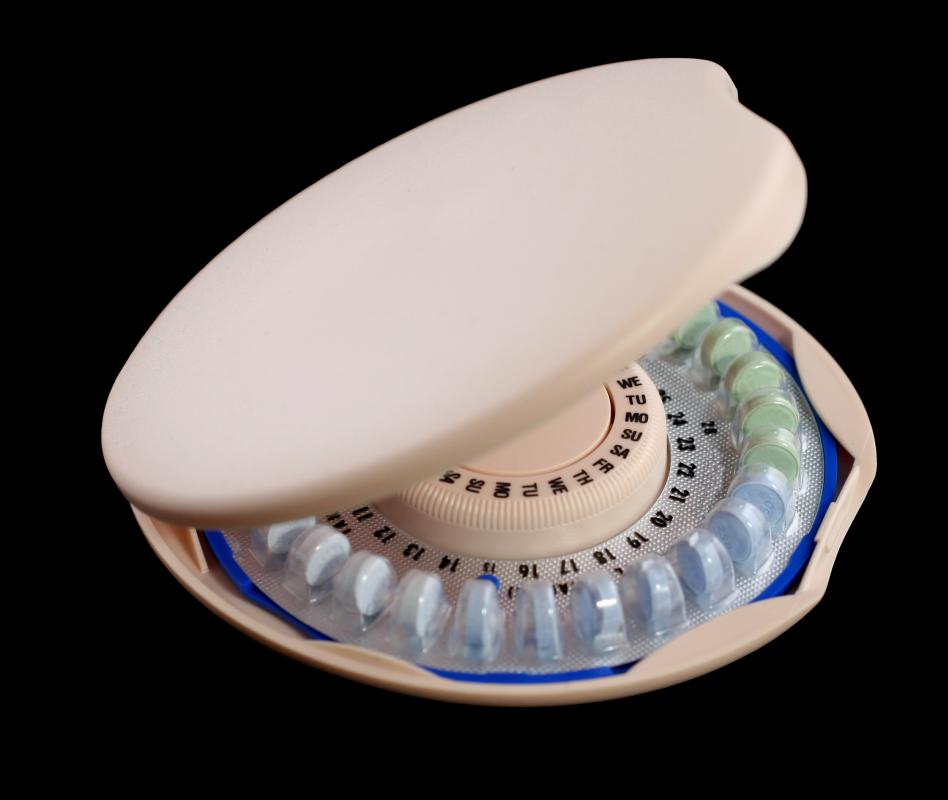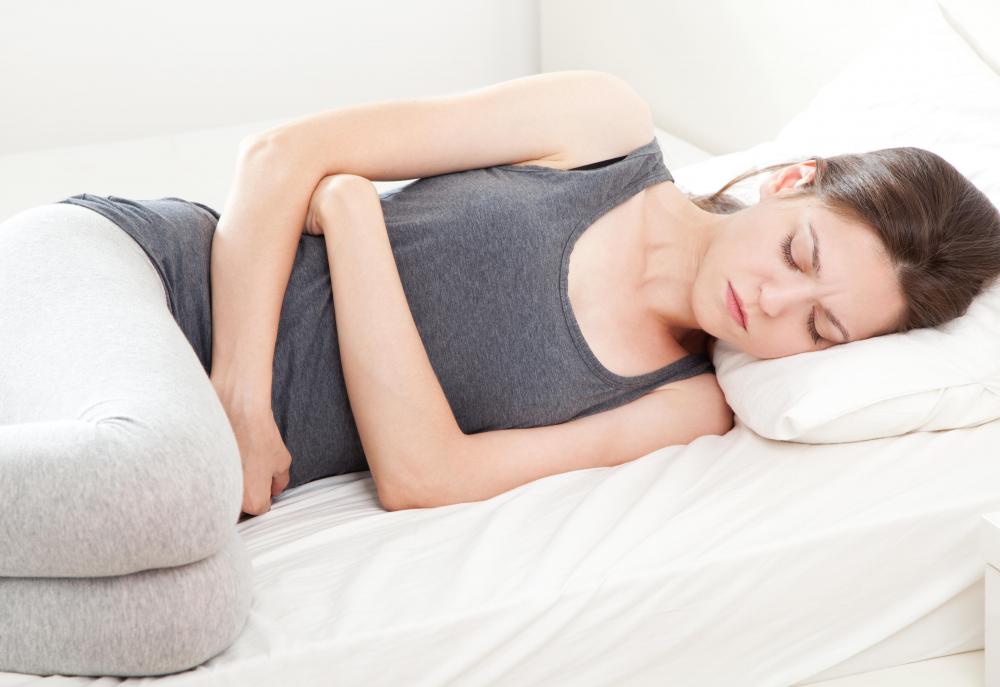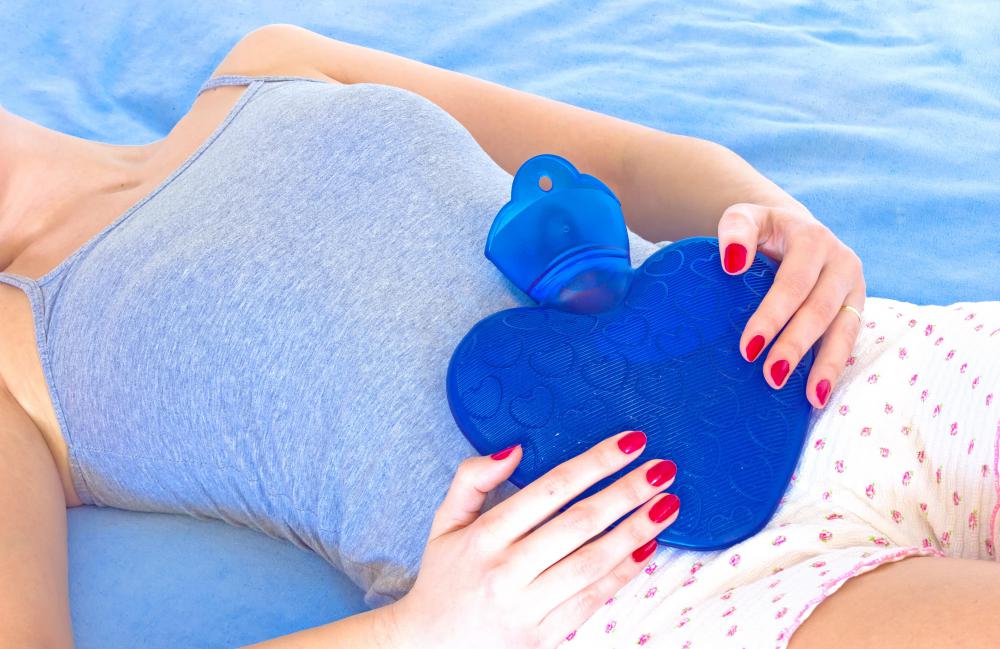At WiseGEEK, we're committed to delivering accurate, trustworthy information. Our expert-authored content is rigorously fact-checked and sourced from credible authorities. Discover how we uphold the highest standards in providing you with reliable knowledge.
What are the Common Causes of Severe Menstruation Cramps?
There are two categories of severe menstruation cramps, which are known medically as dysmenorrhea. The first category is referred to as primary dysmenorrhea and includes menstrual cramps that are the result of strong uterine contractions that tend to occur in women who have not had children. Painful cramps that are related to disease comprise the second category, known as secondary dysmenorrhea. These cramps are usually connected to medical conditions such as uterine fibroids, pelvic inflammatory disease (PID) or endometriosis.
Primary dysmenorrhea results when the uterus contracts sharply enough to disrupt the flow of blood in vessels near its vicinity. Pain occurs when the uterus is deprived of oxygen due to the temporary lack of blood supply. Though the uterus contracts during normal menstruation, women don't always feel the contractions. Women who haven't had children are more likely to experience severe menstruation cramps, and these tend to lessen or might go away entirely after a woman has had a baby. The aging process can sometimes have a mitigating effect on severe cramps, rendering menstrual periods less painful.

Abnormal menstruation occurs with secondary dysmenorrhea, which is related to disorders of the female reproductive system. Cramps connected with disease tend to persist longer than do cramps that result from primary dysmenorrhea. Uterine fibroids cause severe menstruation cramps because they grow inside the wall of the uterus and interfere with its contractions. PID is the result of infection that attacks the reproductive system and causes menstrual pain. Another disease that causes abnormal menstruation is endometriosis, in which uterine tissue grows on other bodily structures, usually on reproductive organs but sometimes on the pelvic lining.

Severe menstruation cramps can be caused by the use of an intrauterine device (IUD) as birth control. Overproduction of prostaglandins can play a part in painful menstruation. Prostaglandins cause the uterus to contract, but they can also contribute to inflammation. Thyroid problems can exacerbate both premenstrual syndrome (PMS) and severe cramps.
Non-steroidal anti-inflammatory drugs (NSAIDs) are often recommended for treating cramps. They are available either over the counter or by prescription from a medical professional. Some women find relief from severe menstruation cramps by taking birth control pills, which prevent ovulation from occurring.

Natural remedies for menstrual cramps can be as effective as medication. A regular exercise routine will help mitigate cramps. Women experiencing severe menstruation cramps might find relief through use of a heating pad. Massage of the lower back can help relieve the pain, and warm baths can also be soothing.
AS FEATURED ON:
AS FEATURED ON:

















Discussion Comments
It seems that my period and my cramps were much worse during my teenage years than they are now. The cramps made me ache all over, especially in my abdomen and in my legs, which felt really heavy and tired.
I had to take PMS relief medication every month back then. The cramps and the bloating went hand in hand, but the medication took care of both of them.
I don't think anything can completely eliminate the cramps, but over the counter medicine can help. I take the kind without caffeine in it, though, because the caffeine once sped my heart up too much.
I had an irregular menstrual cycle for many years. I was never right on schedule, and sometimes, my flow would be extremely heavy. These were the months when the cramps were the worst.
They got so bad that I had to go home from work a few times. I went to my doctor, and she put me on birth control pills.
Sure enough, the pills lessened my misery so much! I always knew when my period would arrive, and it was always a lighter flow than before. I barely had any cramps at all, and the ones I did have weren't debilitating.
I would recommend birth control pills to anyone who is struggling with severe cramps. I no longer have to alter my routine for my period, because I feel nearly normal during it.
@giddion – Swimming relieves my severe menstrual cramps. Moving about slowly in the water as it holds my body up is relaxing.
I think that the fact that the water was warm made a difference, too. I love swimming in late July just before sunset, because that is when the water is at its warmest, and it feels like relaxing in a giant bath tub.
Of course, if you want to swim during colder seasons, you can always join a gym that has an heated indoor pool. That way, you could swim even when it's snowing outside.
I've always heard that exercise can lessen severe period cramps, but this never worked for me. Nothing short of pain pills could help me feel better.
Maybe I was doing the wrong type of exercise. I was just going for a brisk walk. Should I try something more strenuous?
Post your comments